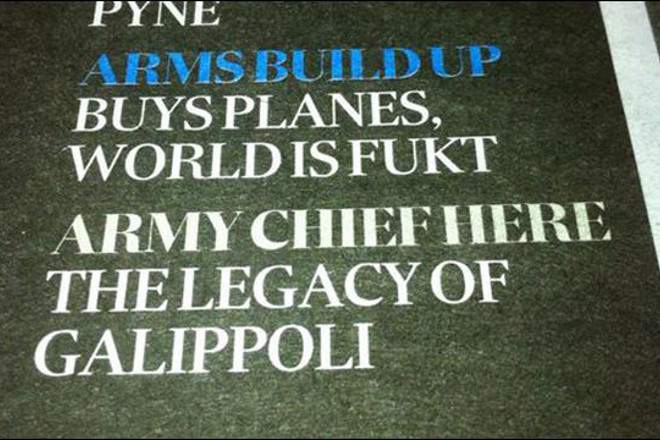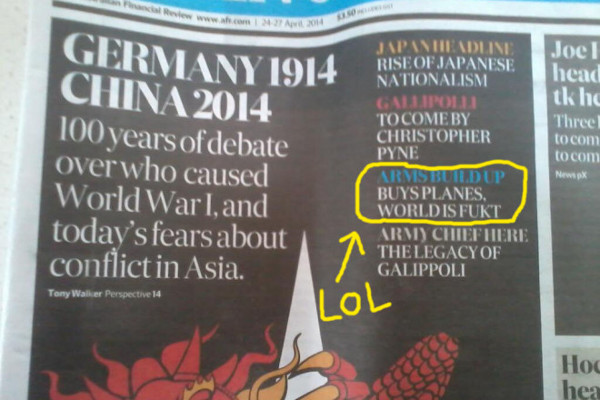Why Is Mainstream Media So Afraid Of Some Little Four-Letter Words?
The AFR's recent unintentional bout of potty-mouth brought up an interesting media conundrum -- to curse or not to curse?

It’s not the sort of thing you’d normally expect from the fastidious fuddy-duddies at the Australian Financial Review. A monumental front-page cock-up full of dummy headlines, blank space, and the glorious icing on the cake, a “WORLD IS FUKT” subheading on a story about Prime Minister Tony Abbott’s $24 billion spending spree on new fighter jets.
The Fin Review‘s unintentional bout of potty-mouth last weekend got me thinking about just how sweary we’re allowed to be in print these days. It sent me down a grand Google rabbit hole, in which I unearthed the following gems:
- In December, Guardian Australia dropped the c-bomb — spelled out in full — in the opening paragraph of a political story.
- That might seem pretty impressive until you look at The Australian‘s effort of 2008, in which it got ‘Look at this, I’m tittie-f..ing your mother’ on its front page, above the fold (the story is thankfully reproduced online).
- According to this Daily Telegraph list, a Liberal MP once called a constituent “fart-face”. Okay, it’s not really a swear word but it is pretty funny.
- The Brisbane Times mastered irony in a 2012 story about a Queensland city often labelled bogan, kicking off the yarn with the f-word in a quote from a local.
- Fox Sports got all Aussie ocker this month, using “pissing down” to describe heavy rainfall during their recap of a boxing bout.
- Much of the Australian media straight out called Bob Carr ‘a wanker‘ when he released his memoir last month.
- On the international stage, BuzzFeed published its official style guide in February, which contains proper style for ‘f..kup’ as a noun, ‘f..k up’ as a verb, and ‘f..ked-up’ as an adjective (the difference is all to do with spaces and dashes, in case you were wondering).
- But The New York Times continues to turn up its sophisticated nose at cuss words, sparking a fabulous Tumblr catalogue devoted to its often awkward expletive avoidance attempts.
–
So where lies the (dotted, asterisked) line?
A commentator writing for the American Journalism Review almost 15 years ago described the mainstream media as “tiptoeing through popular culture, carefully trying to pick colourful stories without grabbing too much colourful language”. Little seems to have changed since then. Sure, publications aimed at a younger, edgier crowd are increasingly happy to litter their copy with cusses (ed note: hello, fuckwits!), but their older, mainstream media cousins remain the profanity police.
An op-ed piece by Jesse Sheidlower for The New York Times in March this year advocated dropping the “coy acrobatics” and printing vulgarities in their full, obscene glory. Euphemisms, he argued, make “stories read as if they were time capsules written decades ago, forcing us all into wink-wink-nudge-nudge territory”. Ironically, Sheidlower went on, they deprive readers of the very thing we’re all after: news and information.
His piece sparked a rash of counter arguments suggesting gentle readers couldn’t handle the foul-mouthed truth. Esteemed periodicals like The Wall Street Journal and The New York Times weighed in, declaring they’d moved with the times and would now occasionally titillate their readers with mild profanities like ‘damn’, ‘hell’ and ‘ass’ — but only when absolutely necessary for clarity.
“The reason should still be clear and the rationing stringent,” NYT associate managing editor for standards Phil Corbett told the American Journalism Review. “The Times’s thoughtful, civil tone will be diminished if the report is peppered with such language.”
The Associated Press, too, has loosened the chain a little. A few decades ago ‘hell’ was an eyebrow raiser, but standards editor Tom Kent reckons “we’ve moved beyond that now. And five years from now, lord knows what we’ll be saying.” But, Kent added, words that may make your mother gasp, like US Vice President Joe Biden’s awkward live TV f-bomb, still get the hyphenation treatment in print.
That prudish attitude is reflected within the Australian Associated Press, which in March sent a company-wide email warning journalists against spelling out off-colour chat after this story went onto the wire with ‘f**k’ in full resplendence.
‘Shit’, on the other hand, seems perfectly acceptable here in Australia. A news archive search of News Limited, Fairfax, AAP and some New Zealand publications showed ‘shit’ was printed in full 800 times over the past four months. That’s more than six shits a day.
The Guardian, and by default Guardian Australia, refuse to fall back on the “cop out” of asterisks. In this rather cool blog post, which looks at whether there are “too many f..ks in The Guardian”, production editor David Marsh uses the arguments of literary luminaries like Charlotte Bronte and Jane Eyre to denounce circumlocutions as weak and futile. “As Charlotte Brontë put it: ‘The practice of hinting by single letters those expletives with which profane and violent people are wont to garnish their discourse, strikes me as a proceeding which, however well meant, is weak and futile. I cannot tell what good it does — what feeling it spares — what horror it conceals.'”, Marsh quoted.
American comic and political satirist Lenny Bruce once said: “Take away the right to say fuck, and you take away the right to say fuck the government.” Unfortunately, much of the mainstream media still seem to be saying… fuck that.
–
Koren Helbig is an Australian freelance writer living in Spain. She has written for publications including New Internationalist, Frankie, Kill Your Darlings and The Lifted Brow, and in a former life, she covered the colourful world of Queensland politics for The Courier-Mail. Koren blogs at The Little Green House and tweets at @KorenHelbig.
